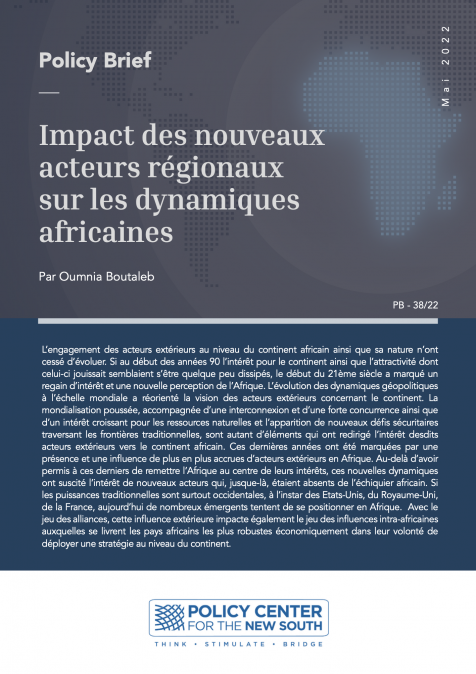Thirty years after its first democratic election, South Africa is heading towards a pivotal moment in its political history. Over 27 million citizens have registered to participate in this month’s general elections to elect 400 members of the National Assembly who will appoint the next head of state. Anticipation mounts as the ruling African National Congress faces the prospect of losing its dominance for the first time since 1994. PCNS explores the implications of these elections.
RELATED CONTENT
-
 AuthorsPascal ChaigneauAlain Oudot de DainvilleRodolphe MonnetFlorent ParmentierOlivier TramondJune 16, 2022Les Dialogues stratégiques, une collaboration entre le HEC Center for Geopolitics et le Policy Center for the New South représentent une plateforme d’analyse et d’échange biannuelle réunissant des experts, des praticiens, des décideurs politiques ainsi que le monde universitaire et les médias au service d’une réflexion critique et approfondie sur les tendances politiques mondiales et les grandes questions d’importance commune pour l’Europe et l’Afrique. Cette publication est ...
AuthorsPascal ChaigneauAlain Oudot de DainvilleRodolphe MonnetFlorent ParmentierOlivier TramondJune 16, 2022Les Dialogues stratégiques, une collaboration entre le HEC Center for Geopolitics et le Policy Center for the New South représentent une plateforme d’analyse et d’échange biannuelle réunissant des experts, des praticiens, des décideurs politiques ainsi que le monde universitaire et les médias au service d’une réflexion critique et approfondie sur les tendances politiques mondiales et les grandes questions d’importance commune pour l’Europe et l’Afrique. Cette publication est ... -
AuthorsMay 26, 2022L’engagement des acteurs extérieurs au niveau du continent africain ainsi que sa nature n’ont cessé d’évoluer. Si au début des années 90 l’intérêt pour le continent ainsi que l’attractivité dont celui-ci jouissait semblaient s’être quelque peu dissipés, le début du 21ème siècle a marqué un regain d’intérêt et une nouvelle perception de l’Afrique. L’évolution des dynamiques géopolitiques à l’échelle mondiale a réorienté la vision des acteurs extérieurs concerna ...
-
 AuthorsSabine CessouMay 17, 2022Ce thème, abordé au Centre HEC de Géopolitique à Jouy-en-Josas, lors de la 12e édition des Dialogues stratégiques avec le Policy Center for the New South, une rencontre semestrielle, a permis de revenir dans le détail sur cette zone qui relie la Méditerranée à l’océan Indien, à la jointure de trois continents : l’Asie, l’Afrique et l’Europe. Cette route maritime qui s’étend sur plus de 2 200 km, pour une largeur qui varie de 300 km à moins de 30 km entre Djibouti et le Yémen, r ...
AuthorsSabine CessouMay 17, 2022Ce thème, abordé au Centre HEC de Géopolitique à Jouy-en-Josas, lors de la 12e édition des Dialogues stratégiques avec le Policy Center for the New South, une rencontre semestrielle, a permis de revenir dans le détail sur cette zone qui relie la Méditerranée à l’océan Indien, à la jointure de trois continents : l’Asie, l’Afrique et l’Europe. Cette route maritime qui s’étend sur plus de 2 200 km, pour une largeur qui varie de 300 km à moins de 30 km entre Djibouti et le Yémen, r ... -
May 13, 2022Depuis 2016, le Policy Center for the New South et le Centre HEC de Géopolitique organisent chaque année deux éditions des « Dialogues Stratégiques ». Cette plateforme d’analyse et d’échange réunit des experts, des chercheurs provenant de différents think-tanks et du monde académique, d...
-
AuthorsApril 26, 2022As China’s presence has expanded into the Horn of Africa, Somaliland has opted to distance itself from Beijing and presented itself as a democratic ally of the West – and Taiwan. On March 17, 2022, three Republican Congressmen introduced a bill titled the “Somaliland Partnership Act,” requiring the American Secretary of State to submit annual reports to Congress on assistance provided to Somaliland and conduct a feasibility study on establishing a security partnership with Somalilan ...
-
AuthorsPatricia AhandaApril 22, 2022Le second tour des élections présidentielles françaises qui se tiendra ce 24 avril 2022 opposera de nouveau Emmanuel Macron, le président sortant, et Marine Le Pen, présidente du Rassemblement national. Pourtant, cette nouvelle élection n’est en rien similaire à celle de 2017. Cette élection est un nouvel affrontement politique entre deux leaders aux projets totalement opposés. C’est un duel politique français marqué par des bouleversements sociaux, économiques, générationnels, pol ...
-
AuthorsApril 15, 2022The shadows of Africa's colonial history loom over the French presidential elections. Emmanuel Macron came to office claiming to be “neither of left nor right,” and hoping to fundamentally transform France’s approach to Africa, and to heal the wounds of colonialism. Given the Russian-Ukraine War, the failure of Operation Barkhane, the rise of the French right, and the general African fatigue with Françafrique, it is not clear if an overhaul of France's African policy is possible. ...
-
April 5, 2022يخصص مركز السياسات من أجل الجنوب الجديد حلقة برنامجه الأسبوعي "حديث الثلاثاء" لمستقبل العلاقات المغربية الاسبانية مع العربي الجعايدي، باحث بارز بمركز السياسات من أجل الجنوب الجديد عرفت العلاقة الثنائية المغربية الإسبانية تطوّرًا ملحوظًا مع إعلان الحكومة الإسبانية مساندتها لمبادرة الحكم ...
-
AuthorsMarch 22, 2022African states are in a vulnerable position. The invasion of Ukraine could affect food security and trigger a spike in oil prices, inflicting economic duress on African households. The Black Sea region is home to vast fertile farmlands, and war in the “breadbasket of the world” could threaten wheat and fertilizer supplies. Increased economic hardship and social discontent do not bode well for democratic governance in Africa, especially in light of the recent spate of military coups. ...
-
AuthorsMarch 17, 2022“Turkey’s turn to Africa is the result of several factors: the economic liberalization process undertaken in the 1990s, Ankara’s aim for greater voice in international institutions, and Turkey's rivalry with Egypt and the Gulf states. Scholars have observed that Turkey's public diplomacy, which some have dubbed the “Ankara consensus” is consciously designed as an alternative to the Washington consensus of neoliberal economic growth and the Beijing consensus of state-led growth, that ...








